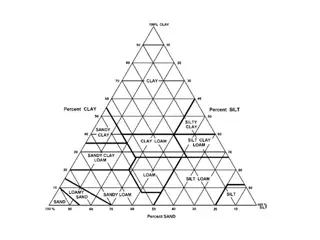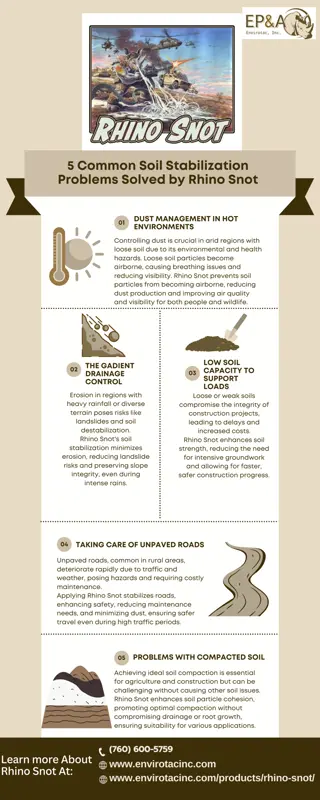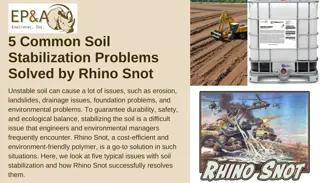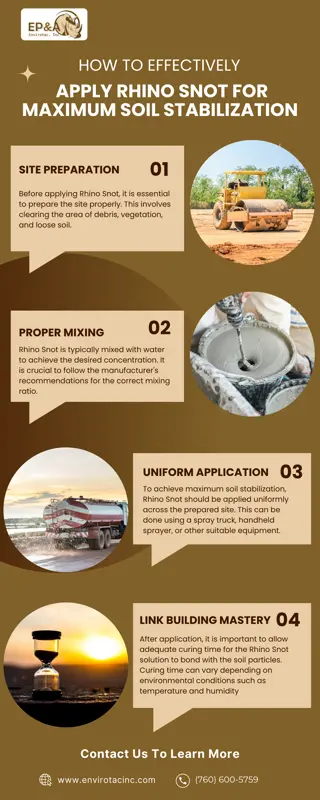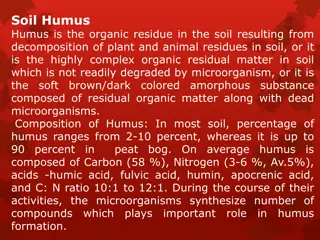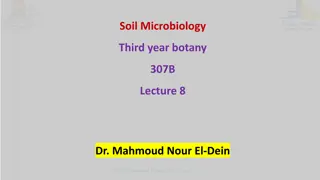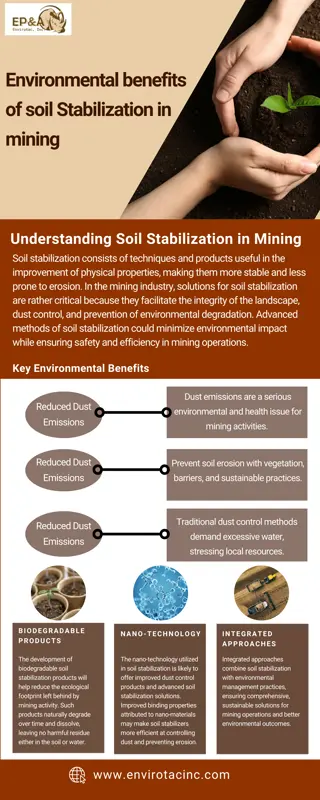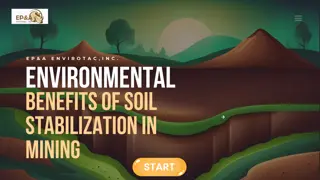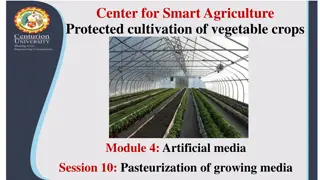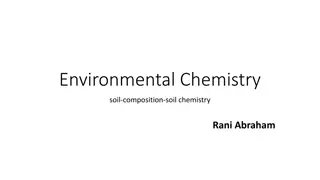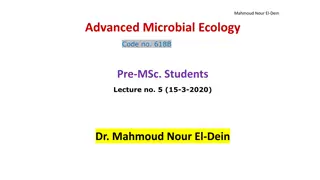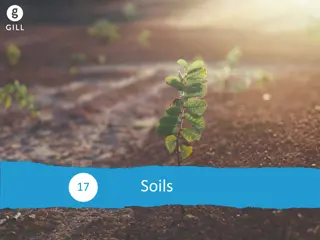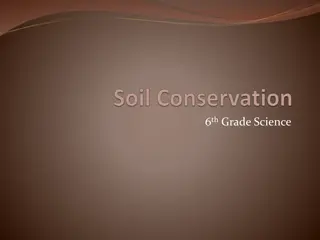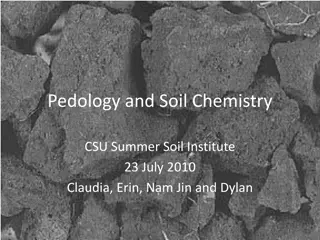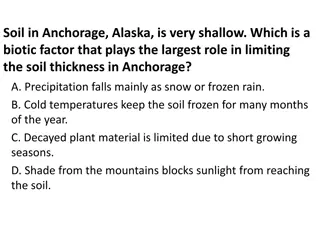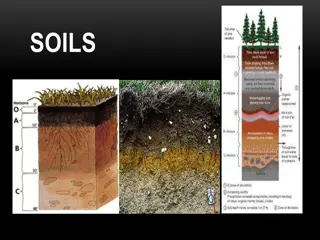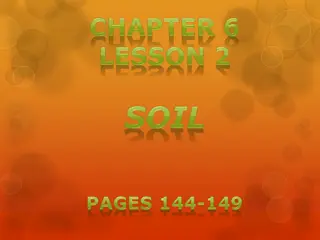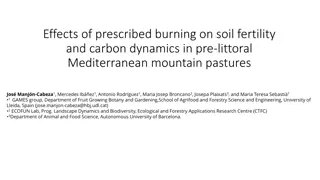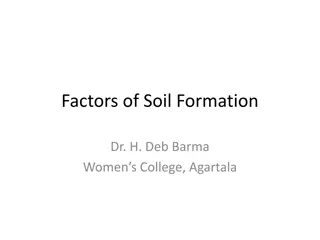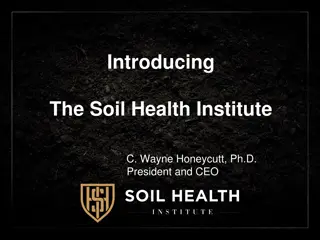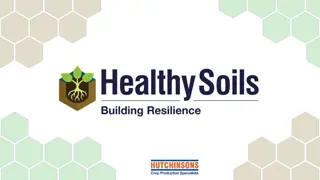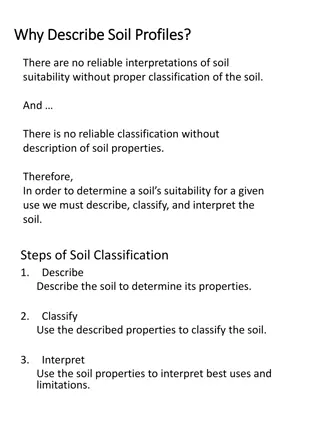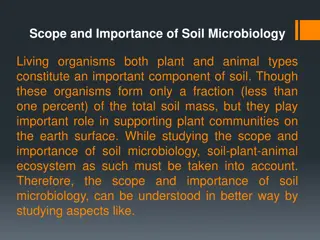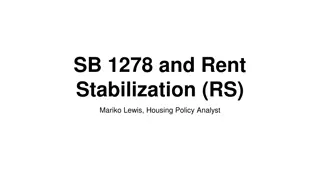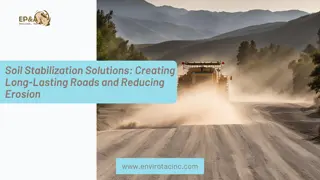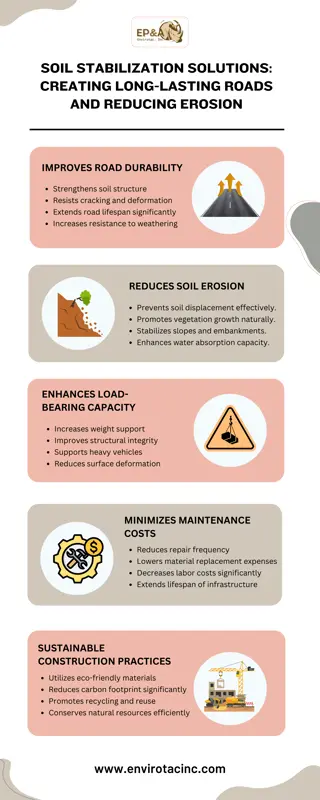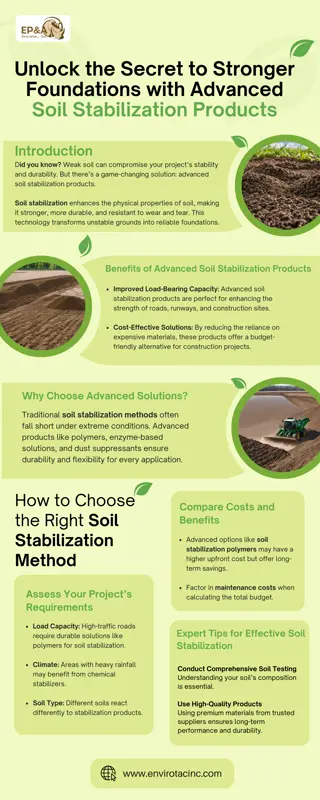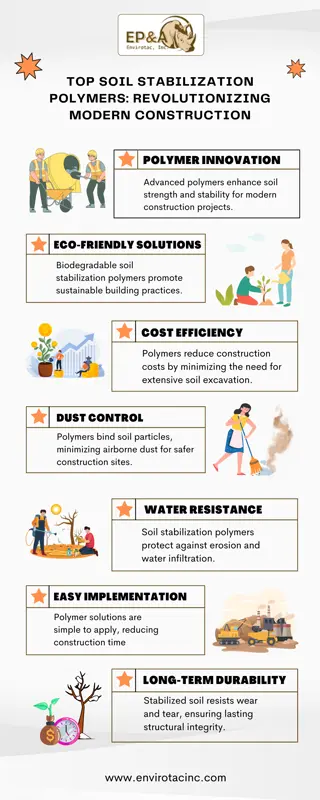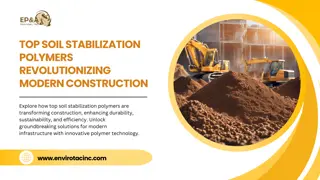Understanding Principles and Practices of Water Management in Agriculture
This course delves into the field water cycle, water movement in soil and plants, soil-plant-water relationships, water dynamics in the soil-plant-atmosphere system, soil composition, soil texture classification, permeability factors, density of soil solids, total porosity assessment, and energy asp
8 views • 62 slides
Evaluation of SPLASH and HRRR Soil Moisture Comparison
This study compares soil moisture data between the HRRR model and SPLASH observations during the 2022 warm season. It explores differences in soil moisture levels at various depths, evaluates responses to precipitation events, and drydown periods. The research focuses on analyzed data from HRRR Mode
3 views • 12 slides
Understanding Water Management: Principles, Practices, and Soil-Water Relations
Explore the principles and practices of water management in agriculture with a focus on water availability, nutrient relationships, and losses. Discover the physical classification of water, available water defined between field capacity and wilting point, soil water potential, and the soil-plant-at
6 views • 17 slides
Understanding the Fate of Herbicides in Soil
The fate of herbicides in soil is influenced by factors such as micro-organism decomposition, chemical decomposition, photodecomposition, adsorption by soil, surface runoff, leaching, plant uptake, and volatilization. Micro-organisms like algae, fungi, actinomyces, and bacteria play a crucial role i
6 views • 7 slides
Effective Methods for Soil Conservation
Methods to reduce soil erosion and promote soil conservation include terracing, contour planting, strip cropping with cover crops, alley cropping, agroforestry, windbreaks, and conservation tillage practices such as no-till and minimum tillage. These methods help in minimizing soil erosion hotspots
2 views • 11 slides
5 Common Soil Stabilization Problems Solved by Rhino Snot
Rhino Snot offers effective solutions for soil stabilization issues, making it a versatile choice for dust control products.
1 views • 1 slides
5 Common Soil Stabilization Problems Solved by Rhino Snot
Rhino Snot offers effective solutions for soil stabilization issues, making it a versatile choice for dust control products.
1 views • 9 slides
How to Effectively Apply Rhino Snot for Maximum Soil Stabilization
Soil stabilization is an important consideration in construction, road building, and environmental management. One of the best products available in the market at this moment is Rhino Snot, A dust control product that is getting popular for extraordi
0 views • 10 slides
How to Effectively Apply Rhino Snot for Maximum Soil Stabilization
Soil stabilization is an important consideration in construction, road building, and environmental management. One of the best products available in the market at this moment is Rhino Snot, A dust control product that is getting popular for extraordi
0 views • 1 slides
Understanding the Importance of Humus in Soil Health
Humus, the organic residue in soil, plays a crucial role in soil fertility and plant growth. It improves soil structure, retains water, stores essential nutrients, and promotes microbial activity. Factors like soil fertility, moisture, temperature, and pH influence the distribution and activity of s
0 views • 21 slides
Understanding Composition of Soil Organic Matter in Soil Microbiology
Soil organic matter is vital for soil properties and plant nutrition. It consists of plant residues, animal remains, and microbial tissues, comprising complex compounds like carbohydrates, proteins, fats, and more. The composition varies with plant type, age, and nature. Leguminous plants are rich i
0 views • 19 slides
Environmental benefits of soil stabilization in mining
Soil stabilization in mining reduces dust emissions, prevents erosion, conserves water, enhances vegetation growth, and minimizes chemical runoff for environmental sustainability.\n
0 views • 1 slides
Environmental benefits of soil stabilization in mining
Soil stabilization in mining reduces dust emissions, prevents erosion, conserves water, enhances vegetation growth, and minimizes chemical runoff for environmental sustainability.\n\n
2 views • 15 slides
Soil Disinfestation Methods for Greenhouse Crop Production
Soil mixes for greenhouse production are carefully designed to optimize water retention and aeration. Proper management of artificial soil mixes can yield crops equal to those grown in topsoil. Sterilization of growing media is crucial, with techniques such as steam sterilization and fumigation comm
0 views • 11 slides
Understanding Soil Chemistry and Redox Reactions in Environmental Chemistry
Soil chemistry plays a crucial role in sustaining healthy soils by influencing nutrient availability through oxidation and reduction processes. Redox reactions in soil are impacted by factors like oxygen content and water presence, affecting nutrient supplies. The redox status of soil reflects its n
1 views • 92 slides
Understanding the Diversity of Microorganisms in Soil Ecosystems
Microorganisms in soil play crucial roles in soil fertility, nutrient cycling, and industrial product synthesis. They can also be pathogens causing diseases in plants and humans. Soil organisms are broadly classified into two groups: soil flora and soil fauna, consisting of various microorganisms li
0 views • 57 slides
Soil Erosion Control and Sustainable Land Management A Guide Ensuring Sustainable Water Use for Soil Stabilization (1)
Soil erosion control and sustainable land management are crucial for preserving soil health and water resources, using stabilization and dust control for environmental protection.\n
0 views • 1 slides
Understanding Soil Composition and Importance
Explore the world of soil and its significance as a natural resource by discovering its composition and how it affects plant growth. Learn about the main ingredients of soil, its permeability, and the role of water, air, and organic matter. Gain insights into how soil supports plant life through lea
1 views • 30 slides
Understanding Soil Erosion and Conservation in 6th Grade Science
Soil erosion is the process of soil wearing away, commonly caused by natural forces like wind, water, gravity, and ice, as well as human activities such as farming, mining, and construction. Severe weather events can accelerate soil erosion. Soil conservation techniques like crop rotation, conservat
0 views • 12 slides
Soil Chemistry and Mineralogy Analysis at CSU Summer Soil Institute
Explore the comprehensive analysis of soil chemistry, texture, and mineralogy conducted at the CSU Summer Soil Institute in July 2010. The study delves into pedology, elemental composition, particle size distribution, X-ray diffractometry, and mineralogical composition of various soil samples. Detai
0 views • 22 slides
Understanding Soil Characteristics and Ecosystem Interactions
This content explores various aspects of soil characteristics, including factors influencing soil thickness, the role of bedrock in soil quality, optimal soil mixtures for plant growth, the impact of living organisms on weathering, and the formation of soil. It also discusses how animals can help so
0 views • 17 slides
Understanding Soil: Formation, Composition, and Impact on Plant Growth
Soil is more than just dirt; it plays a vital role in supporting plant growth. Formed through the weathering of rocks and organic activity, soil consists of rock fragments, clay, and organic material. The process of soil formation begins with the erosion of bedrock, leading to the development of dif
0 views • 12 slides
Exploring the Fascinating World of Soil: An Insightful Journey
Delve into the intricate composition of soil through a hand lens to uncover rocks, minerals, and humus. Discover the hidden elements like water, air, and living organisms that form the foundation of soil. Witness the decomposition process by bacteria and fungi, and explore the layers of a soil profi
0 views • 15 slides
Impacts of Prescribed Burning on Soil Fertility in Mediterranean Pastures
This study investigates the effects of prescribed burning on soil fertility and carbon dynamics in Mediterranean mountain pastures. It explores how soil responds to disturbance by prescribed burning, potential legacy effects based on pre-burning conditions, and the role of local microtopography in s
0 views • 8 slides
Understanding Factors of Soil Formation and Soil Geography
Soil formation is a complex process influenced by factors like weathering, organic matter, and minerals. Soil geography studies soil distribution using geographic methods and cartography. Various definitions of soil highlight its importance for plant growth and as a natural body with distinct horizo
0 views • 20 slides
Understanding Soil Health for Sustainable Ecosystems
Soil health, defined as the capacity of soil to function as a living ecosystem supporting plants, animals, and humans, is crucial for sustaining life. This content explores the imperatives, opportunities, and key practices such as no-till and cover crops to enhance soil health. It also delves into d
0 views • 33 slides
Neural Network Control for Seismometer Temperature Stabilization
Utilizing neural networks, this project aims to enhance seismometer temperature stabilization by implementing nonlinear control to address system nonlinearities. The goal is to improve control performance, decrease overshoot, and allow adaptability to unpredictable parameters. The implementation of
0 views • 24 slides
Microbial Transformations of Nitrogen in Soil: Factors, Forms, and Impact on Plant Nutrition
Understanding the microbial transformations of nitrogen in soil is crucial for optimizing plant nutrition. Factors such as climate, water supply, cultivation, soil texture, and depth influence the nitrogen content in soil. The different forms of soil nitrogen, including inorganic and organic compoun
0 views • 23 slides
Understanding the Role of Soil Biology in Lawn Care
Soil biology plays a crucial role in maintaining healthy and vibrant lawns. Various organisms, including invertebrates, plant roots, mycorrhizae, and micro-organisms, contribute to functions such as soil structure maintenance, regulation of soil hydrological processes, gas exchange, carbon sequestra
0 views • 27 slides
Importance of Describing Soil Profiles for Soil Suitability Analysis
Proper classification and interpretation of soil properties through describing soil profiles are essential in determining soil suitability for various uses. Soil classification involves describing, classifying, and interpreting soil properties to understand the best uses and limitations of the soil.
0 views • 5 slides
Understanding the Scope and Importance of Soil Microbiology in Ecosystems
Soil microbiology plays a significant role in supporting plant communities and maintaining soil health. Living organisms, both plant and animal types, form only a small fraction of soil mass but are crucial for processes like plant growth, organic matter decomposition, humus formation, and biogeoche
0 views • 14 slides
Toolkit for Emotional and Mental Well-being Through Body Mindfulness
This toolkit offers a comprehensive approach to emotional and mental well-being by focusing on body mindfulness techniques. It includes activities and quizzes for victim status awareness, body stabilization, emotional stabilization, cognitive stabilization, and social stabilization. Through practice
0 views • 8 slides
Overview of Rent Stabilization in Housing Policy
Rent stabilization is a system regulating annual rent increases, aiming to stabilize rents, protect tenants, and address housing instability. This system, with key components outlined in SB 1278, has a history linked to wartime rent control and has seen a resurgence in various cities and states. Ten
0 views • 11 slides
Soil Stabilization Solutions: Creating Long-Lasting Roads and Reducing Erosion
Discover long-lasting road solutions with soil stabilization! Enhance durability, reduce erosion, and minimize maintenance with innovative methods. Contact Envirotac Inc. today!\n\n
0 views • 9 slides
Soil Stabilization Solutions Creating Long-Lasting Roads and Reducing Erosion (1
Discover long-lasting road solutions with soil stabilization! Enhance durability, reduce erosion, and minimize maintenance with innovative methods. Contact Envirotac Inc. today!\n
0 views • 1 slides
Unlock the Secret to Stronger Foundations with Advanced Soil Stabilization Products
Advanced soil stabilization products are transforming construction by reinforcing soil strength and improving durability. They enhance load-bearing capacity, optimize efficiency, and support sustainable infrastructure development. Whether for roads,
0 views • 1 slides
Unlock the Secret to Stronger Foundations with Advanced Soil Stabilization Products (1)
Advanced soil stabilization products are transforming construction by reinforcing soil strength and improving durability. They enhance load-bearing capacity, optimize efficiency, and support sustainable infrastructure development. Whether for roads,
0 views • 12 slides
Snap Stabilization in Message Passing Systems
Snap-stabilization is a self-stabilization technique that allows algorithms to operate correctly from any initial state without requiring shared registers. In message passing systems, nodes communicate through bidirectional asynchronous channels, with limitations imposed on channel capacity to enabl
0 views • 6 slides
Top Soil Stabilization Polymers Revolutionizing Modern Construction
Soil stabilization polymers are transforming construction by enhancing soil strength and durability while minimizing environmental impact. \ud83c\udf0d\u2728 These advanced materials improve road foundations, prevent erosion, and ensure sustainable l
0 views • 1 slides
Top Soil Stabilization Polymers: Revolutionizing Modern Construction
Soil stabilization polymers are transforming construction by enhancing soil strength and durability while minimizing environmental impact. \ud83c\udf0d\u2728 These advanced materials improve road foundations, prevent erosion, and ensure sustainable l
0 views • 11 slides




